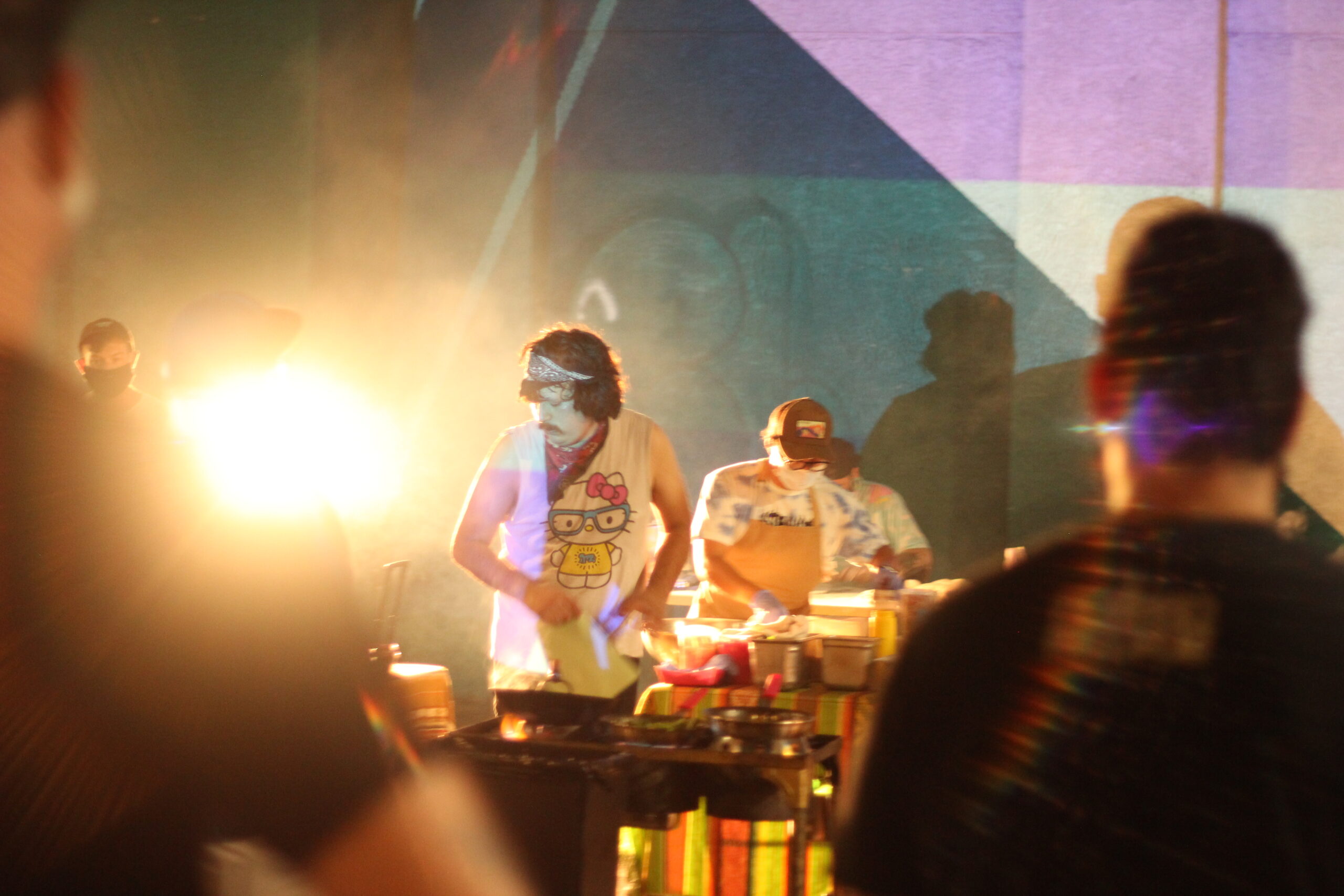Diego Argoti lives his life in extremes, but after a decade of working at some of L.A.’s most celebrated restaurants, he’s realized it is not sustainable. Argoti started Estrano, self-described as “street pasta,” as an act of survival and creative expression. A palpable feeling that’s felt when you visit his bizarre, eccentric, weird, emo, energetic, strange pop-up. His food has an element of disruption, challenging your palette with hyper-specific nostalgia through the vehicle of pasta.
In a recent pop-up, he and his crew set up in Echo Park. It’s a slightly chilly night and the line is already halfway down the block. Someone starts passing out slices of Domino’s pizza with caviar on top. On IG he described it as caviar bumps and I almost asked if I had to take it up the nose. The pizza was an act of kindness from Argoti, for having people wait. Because Argoti is still plagued with the same question every time: What if no one shows up?
But to everyone’s surprise in line, Estrano moves with the beastly efficiency of a full-service restaurant. Your order trickles out at a quick pace, potato pancakes topped with a thick slab of grilled tongue so beefy, you’d think it is a ribeye, a paper tray of ketchup and mustard lasagna in a beef ragu and velveeta mornay and topped with fries, broccoli beef ravioli with beef cheek and brown butter. You never feel like you’ve been waiting too long. No where near the three hour wait time to get a burger from Burgers Never Say Die back in the pop-up days. (yes, I did wait that long).
The vibe at Estrano is animated with a hodgepodge collection of weird foos, misfits, rockeros, punks, emos, cooks, chefs, influencers etc. There’s a DJ with a laptop on a table made of a skateboard, projecting moving images of the word “ESTRANO,” as the light washes over Argoti and his crew dancing the dance of chefs.
I later learned that the DJ who curated the music and vibes is Argoti’s homie Alfredo Krayem, he goes by Halfmann Music and he shows up to every pop-up. He creates a GIF and modulates the colors with a switchboard to produce an erratic and hypnotizing strobe light effect, more seizure-inducing than the Porygon episode of Pokemon.
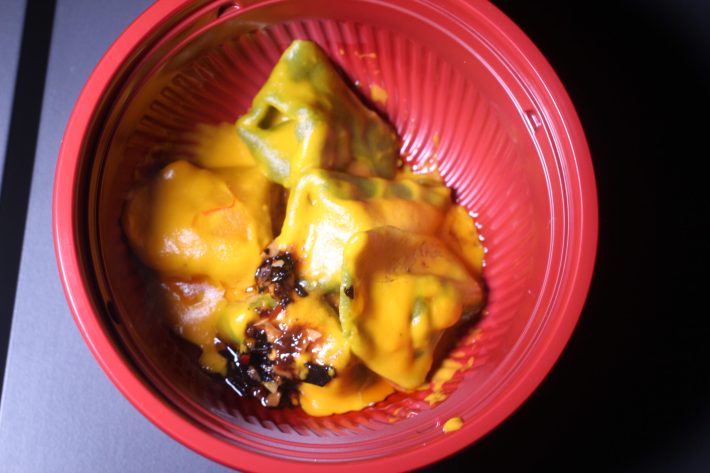
In the back, you can see Johnny Ryan Murphy, pressing dough into a ribbed wooden board making cavatelli. To the right is a pick-up truck with a make-shift hearth built over bricks, with wisps of flames escaping the metal grate. Then in the center, like a hair metal band frontman, is Argoti, rocking a 70s porn stache, maneuvering a wok and boiling pasta, with the swift and chaotic movements of a maestro commanding music.
After years of covering and going to pop-ups, I’ve never come across anything like this. It was like if you went to a background punk or ska show, but instead of a band, everyone’s watching Estrano make pasta with cumbias, metal, and random Latin dance music as the soundtrack.
But not just any pasta, really fucking weird pasta.
I mean that in the best way possible. Sure the idea is to disrupt your ideas of pasta but also using and expanding on the various “pasta” dishes from different cultures. The green curry biang biang combines Chinese noodles with creamy, herby, and slightly spicy Thai curry. The tortellini en pozole verde packs the entire pozole experience into chewy dumplings housing a rich and savory mixture of pork shoulder, hominy, and chicken feet. The black metal Maruchan is like if jjajangmyeon and menudo had a goth child, noodles covered in a squid ink sauce with extremely beefy honeycomb tripe. The beef tongue llapingacho, a seared potato pancake reinforced with cheese, comes from Argoti’s Ecuadorian heritage.
“It’s also changing Ecuadorian food. A llapingacho always comes with fritada, it’s like our version of carnitas. It’s very traditional like Italian food. But if you do beef tongue it's not traditional at all,” says Argoti.
For Halloween and a few November pop-ups, Estrano featured a tasting menu, where Argoti stretched his legs. Dishes like a pork belly funnel cake, a thick slab of savory pork that tastes like french toast, or stuffed pappardelle padded with lush smoked beef tongue, or mad scientist creations like a squid head stuffed with rabbit sausage.
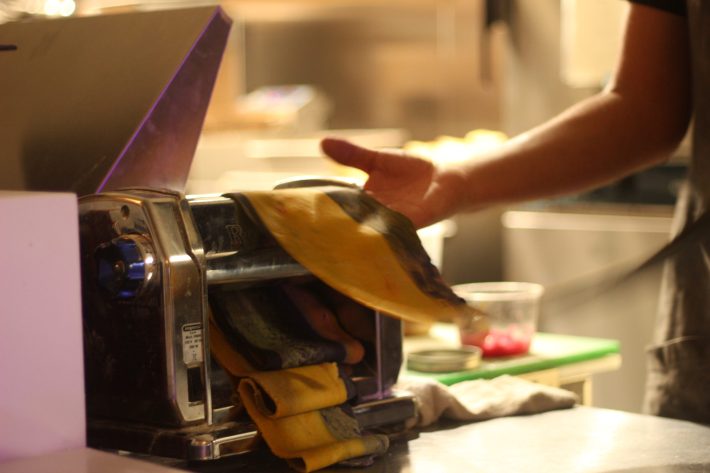
Desserts are a mainstay in every menu: gelatos, donuts, ice creams, and sorbets. The tomatillo coconut sorbet stands out, a wallop of creamy and tangy flavors while the black garlic gelato is sharp with black garlic umami with crunchy chocolate-covered potato chips for texture.
To Live and Die in Burbank
I interviewed Argoti at Corner Cottage in his hometown of Burbank. In the background, the sound of metal clanging emanated from the kitchen, like samurais engaged in a deadly battle of swords.
Growing up in Burbank, Argoti had a penchant for drawing and going to backyard shows, eventually even starting his own band called Mas Turbo with Krayem. “Growing up in Burbank is really the backbone of how I do things. Being a weirdo with immigrant parents in the suburbs, a bike ride away from Hollywood really shapes you,” Argoti explains.
He always liked food and eventually became obsessed with it. While music and art are a big part of his life, cooking allowed him to fully execute his ideas. “I never wanted to be a chef, I loved food too much,” he says.
In his 20s, Argoti’s passion for cooking was fueled by romance and eventually heartbreak. After moving to Pittsburgh for love he eventually went back to L.A. when the relationship ended. Oddly enough, the heartbreak served as inspiration for cooking as he hopped around kitchens like Doomie’s and Red Hill.
Argoti is a veteran of many celebrated kitchens in L.A. but the one that inspired him to be a chef was Bestia. Around 2013, he went to the restaurant to apply for a stage, a food internship. He heard about a chef at Angelini Osteria who made coda alla vaccinara with a bit of chocolate in it, that chef was Ori Mensahe. Argoti was impressed by Mensahe’s use of chocolate because the dish originally used cacao nibs to mask the rotting smell.
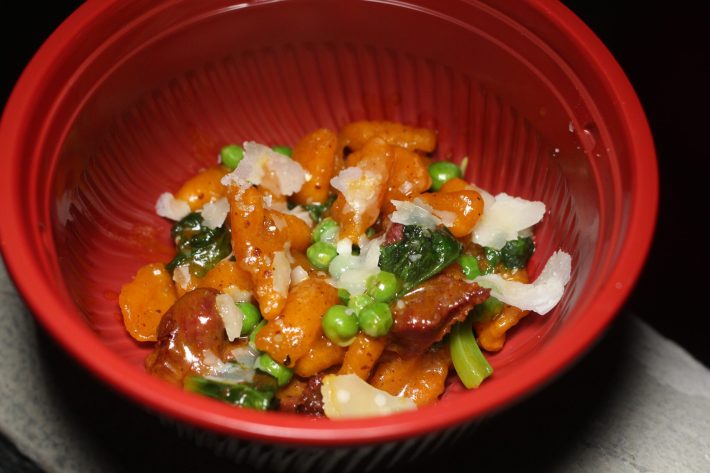
For better or worse at Bestia is where he learned how to be a chef. In those days he felt like he was a part of something and he fully committed himself to the lifestyle. In the following years he worked at Chi Spacca, Broken Spanish, and eventually came back to Bestia. In 2019, he was part of the opening crew for Bavel as a sous chef.
Part of the chef lifestyle is an overcommitment to work and the culture demands extremes like 18-hour shifts, six days a week. During the pandemic, Argoti started using substances to get him through the grueling hours. The lifestyle was taking a toll.
His first wake-up call was in March of 2020 when Argoti’s father had a health scare. He quit Bavel a few months later to take care of him.
“I was really good at my job but I wasn’t happy,” Argoti says. “I didn’t like how I treated people. But it was encouraged. It’s just the way that the structure of restaurants work, but it’s done.”
Rebirth: Estrano as Therapy
Estrano started because of a combination of things. The state of Argoti’s father’s health, the burn out over the years of long hours at restaurants, the desire to do something on his own, and Noma making cheeseburgers in the pandemic.
“When I saw Noma was making cheeseburgers, I was like okay, cool, the idea of ‘the best’ doesn’t matter anymore,” he says.
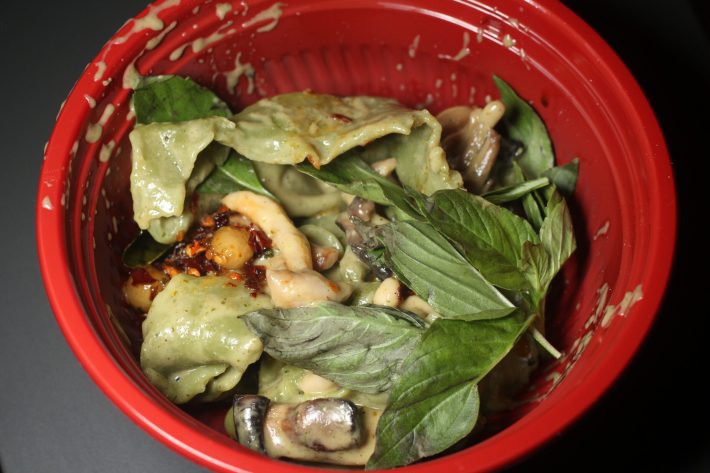
Estrano was meant to be a fun project to pass the time but it became a salvation and rebirth. The first few Estrano pop-ups were difficult because he was still using coke and drinking. He recalls blacking out and waking up with $600 dollars in his pocket. His friends told him that he had something great but warned that the drug use would ruin it. The following day he started his sobriety.
The following pop-ups were difficult because Argoti was still detoxing. He recalls having cold sweats when he was making pasta. But there was a shift, Estrano became what it is today, a platform for change and a new life.
After a year of sobriety and around Estrano’s first-year anniversary, he relapsed. But through Estrano and the kindness and support of his friends, Argoti has remained sober. Part of that is also unlearning things that were drilled into him working at restaurants, like asking for help.
“You never asked for help, it shows weakness,” he says. “Estrano isn’t about me. It’s about us. It’s not about me doing it by myself. I can’t do it without everyone involved, including the customers. One of my biggest fears is no one showing up.”
The Estrano team is ever-growing and made possible by folks like Johnny Ryan Murphy, Rachel Verharst, Michael Walker, Jose Lopez aka Wuigi, and a roster of Argoti’s friends and coworkers from Bavel and the restaurant industry. Estrano is a symbol and refuge for folks who want to cook and celebrate the eccentric and most importantly fun aspects of cooking. Setting up and materializing restaurants in a matter of hours without the hierarchical structure of a restaurant.
Argoti used to think of Estrano as temporary, like Bobby DeNiro in Heat, never getting attached in case he needed to walk away in 30 seconds flat. Argoti was ready to burn it all down but that changed. “I had to admit to myself that I actually cared about it, because for so long I acted like I didn’t,” admits Argoti, “It saved me when I needed it to.”
Estrano isn’t about money. Actually, there’s an element of danger involved with each pop-up, taking financial and creative risk alike, the idea that it might fail and no one will show up—the secret fuel that keeps it going. In order to fund the operation, Argoti has consulting and other creative projects like a waffle menu at Alma’s Cider and Beer in Virgil Village and selling excellently fermented tepache. Whatever it takes to fund the next Estrano.
“It’s an outlet,” Argoti says.
Estrano was born out of how restaurants are changing in L.A. It is talent outside of convention and growing from darkness. Estrano is a fuck you and a love letter to restaurants at the same time. It is a collection of competing forces channeled through pasta and tasting menus. The cheeseburger ravioli, therefore, is more complicated than simply just nostalgia, it is a transmutation of high caliber cooking and the dawn of a new age of cooking and eating in L.A.
In that way, each Estrano pop-up is like the great big gig in the sky, everyone there ready to risk it all, for the performance of a lifetime on stage; whether that’s in a parking lot or alleyway, packed with a bunch of weirdos making and eating pasta.
Estrano is popping up tonight. Get all the details on their Instagram account.
